Related Research Articles

The Liberal Party was one of the two major political parties in the United Kingdom, along with the Conservative Party, in the 19th and early 20th centuries. Beginning as an alliance of Whigs, free trade–supporting Peelites, and reformist Radicals in the 1850s, by the end of the 19th century, it had formed four governments under William Gladstone. Despite being divided over the issue of Irish Home Rule, the party returned to government in 1905 and won a landslide victory in the 1906 general election.
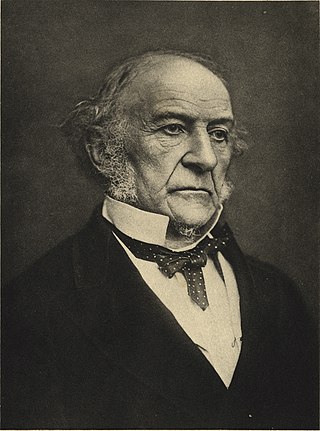
William Ewart Gladstone was a British statesman and Liberal politician. In a career lasting over 60 years, he served for 12 years as Prime Minister of the United Kingdom, spread over four non-consecutive terms beginning in 1868 and ending in 1894. He also served as Chancellor of the Exchequer four times, for over 12 years.
The Whigs were a political faction and then a political party in the Parliaments of England, Scotland, Ireland, Great Britain, and the United Kingdom. Between the 1680s and the 1850s, the Whigs contested power with their rivals, the Tories. The Whigs merged into the Liberal Party with the Peelites and Radicals in the 1850s. Many Whigs left the Liberal Party in 1886 to form the Liberal Unionist Party, which merged into the Conservative Party in 1912.
The Liberal Unionist Party was a British political party that was formed in 1886 by a faction that broke away from the Liberal Party. Led by Lord Hartington and Joseph Chamberlain, the party established a political alliance with the Conservative Party in opposition to Irish Home Rule. The two parties formed the ten-year-long coalition Unionist Government 1895–1905 but kept separate political funds and their own party organisations until a complete merger between the Liberal Unionist and the Conservative parties was agreed to in May 1912.

Sir Henry Campbell-Bannerman was a British statesman and Liberal politician who served as Prime Minister of the United Kingdom from 1905 to 1908 and Leader of the Liberal Party from 1899 to 1908. He also served as Secretary of State for War twice, in the cabinets of Gladstone and Rosebery. He was the first first lord of the treasury to be officially called the "prime minister", the term only coming into official usage five days after he took office. He remains the only person to date to hold the positions of Prime Minister and Father of the House at the same time, and the last Liberal leader to gain a UK parliamentary majority.

Robert Offley Ashburton Crewe-Milnes, 1st Marquess of Crewe,, known as The Honourable Robert Milnes from 1863 to 1885, The Lord Houghton from 1885 to 1895 and as The Earl of Crewe from 1895 to 1911, was a British Liberal politician, statesman and writer.

John Morley, 1st Viscount Morley of Blackburn,, was a British Liberal statesman, writer and newspaper editor.
In the United Kingdom, the word liberalism can have any of several meanings. Scholars primarily use the term to refer to classical liberalism. The term can also mean economic liberalism, social liberalism or political liberalism. It can simply refer to the politics of the Liberal Democrats, a UK party formed from the merger of two centrist parties in 1988. Liberalism can occasionally have the imported American meaning; however, the derogatory connotation is much weaker in the UK than in the US, and social liberals from both the left and right wing continue to use liberal and illiberal to describe themselves and their opponents, respectively.
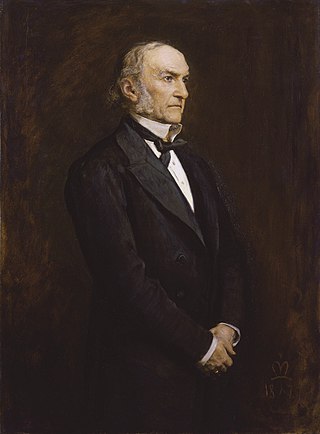
Gladstonian liberalism is a political doctrine named after the British Victorian Prime Minister and Liberal Party leader William Ewart Gladstone. Gladstonian liberalism consisted of limited government expenditure and low taxation whilst making sure government had balanced budgets and the classical liberal stress on self-help and freedom of choice. Gladstonian liberalism also emphasised free trade, little government intervention in the economy and equality of opportunity through institutional reform. It is referred to as laissez-faire or classical liberalism in the United Kingdom and is often compared to Thatcherism.
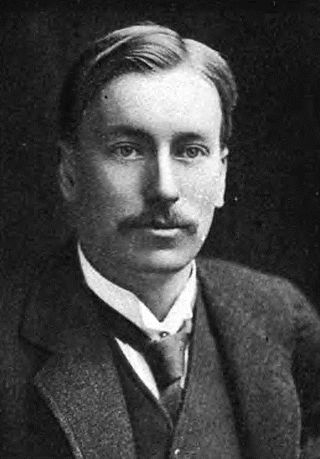
Francis Wrigley Hirst was a British journalist, writer and editor of The Economist magazine. He was a Liberal in party terms and a classical liberal in ideology.
The Free Breakfast Table was the demand of British working-class Liberalism from the 1860s to the early twentieth century. It entailed abolishing duties on basic foodstuffs as these were indirect taxes and therefore regressive. It was as a result of the abolition of Protectionism.

The Liberal government of the United Kingdom of Great Britain and Ireland that began in 1905 and ended in 1915 consisted of two ministries: the first led by Henry Campbell-Bannerman and the final three by H. H. Asquith.
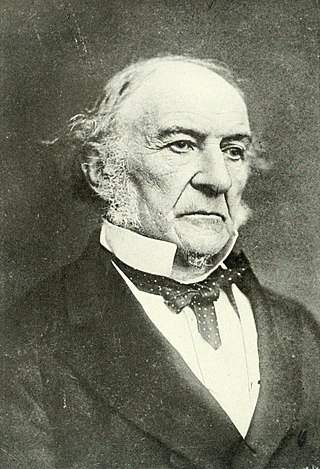
William Ewart Gladstone was the Liberal prime minister of the United Kingdom of Great Britain and Ireland on four separate occasions between 1868 and 1894. He was noted for his moralistic leadership and his emphasis on world peace, economical budgets, political reform and efforts to resolve the Irish question. Gladstone saw himself as a national leader driven by a political and almost religious mission, which he tried to validate through elections and dramatic appeals to the public conscience. His approach sometimes divided the Liberal Party, which he dominated for three decades. Finally Gladstone split his party on the issue of Irish Home Rule, which he saw as mandated by the true public interest regardless of the political cost.
The Relugas Compact was the plot hatched in 1905 by British Liberal Party politicians H. H. Asquith, Sir Edward Grey, and R. B. Haldane to force the prospective prime minister, Sir Henry Campbell-Bannerman, to give up the leadership of the party in the House of Commons. The Compact is significant because it represents a new way of doing party political business at the highest level. In an era when aristocratic power was still taken for granted, the manoeuvring for the highest office in the land represented for the first time distinct political philosophies vying for control of one of the major parties. Learning from an association with Tories Salisbury and Balfour at Hatfield, the Liberal Imperialists stole a march on their rivals to take a step nearer modernisation. Moreover, they brought with them junior ministers such as Sidney Buxton and Henry Fowler, making it look like a take over from the Gladstonian Radicals, of whom the ageing Prime Minister was the last.
Retrenchment is an act of cutting down or reduction, particularly of public expenditure.
Eugenio F. Biagini is an Italian historian, specialising in democracy and liberalism in nineteenth- and twentieth-century Britain, Ireland and Italy, and is currently Professor in Modern British and European History at the University of Cambridge. He is best known for his work in free trade economics and ideology, the Italian risorgimento, Irish national identity, and the religious dimension of popular radicalism in the nineteenth century.
William Edwin Adams was an English Radical and journalist.
Walter Freer was a Scottish Liberal Party worker. He was the son of a notable Chartist and has been described as a "staunch Gladstonian". He was also a power-loom tenter and temperance worker.
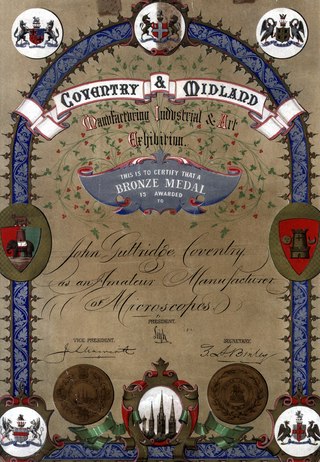
Joseph Gutteridge was an English silk weaver and naturalist.
The Liberal Imperialists were a faction within the British Liberal Party around 1900 regarding the policy toward the British Empire. They supported the Second Boer War which most Liberals opposed, and wanted the Empire ruled on a more benevolent basis. The most prominent members were R. B. Haldane, H. H. Asquith, Sir Edward Grey and Lord Rosebery.
References
- E. F. Biagini, Liberty, Retrenchment and Reform. Popular Liberalism in the Age of Gladstone, 1860–1880 (Cambridge University Press, 1992).
- R. B. McCallum, The Liberal Party from Earl Grey to Asquith (London: Victor Gollancz, 1963).